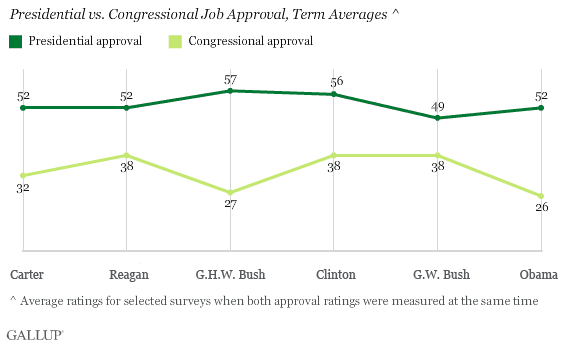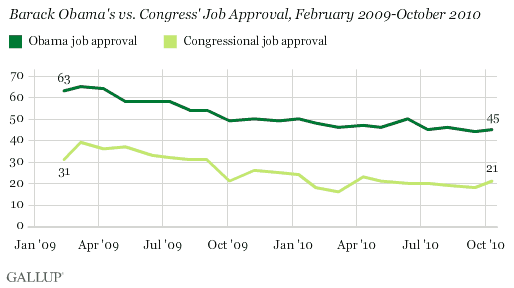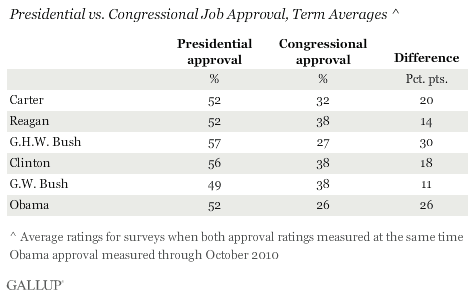PRINCETON, NJ -- Since he took office, President Barack Obama's job approval ratings have averaged 26 percentage points higher than Congress' approval ratings in surveys where both were measured at the same time. This is a greater presidential approval edge than what ÆéûÜǨû§found for four of the previous five presidents, with the exception being the elder George Bush.

More specifically, across 21 polls conducted since Obama took office in which ÆéûÜǨû§measured both presidential and congressional job approval, 52% of Americans approved of Obama and 26% approved of Congress -- a 26-point gap. George W. Bush's average lead in approval over Congress during his eight years in office was 11 points, 49% to 38%. Bill Clinton had an average 18-point edge and Ronald Reagan a 14-point edge. By contrast, the elder George Bush's average approval rating was 30 points higher than Congress' approval rating in seven contemporaneous readings of the two measures conducted between 1990 and 1992.
It should be noted that congressional approval was measured fairly infrequently prior to 1993, and thus, the average ratings calculated for presidents Carter, Reagan, and George H.W. Bush are based on relatively few cases. However, ÆéûÜǨû§initiated more frequent updates of the measure in 1993 and implemented monthly updates in 2001 -- thus providing robust comparative statistics for the Clinton, G.W. Bush, and Obama presidencies.
A Steady Picture From 2009-2010
Obama's average 26-point approval lead over Congress is typical of the size of the individual Obama-congressional approval gaps measured during the past two years. Most recently, Obama had a 45% job approval rating in Gallup's early October Crime poll, compared with Congress' 21% approval rating -- a 24-point gap.

Bottom Line
Today and throughout his time in office, President Obama has received a substantially higher approval rating from the American people than has Congress. The average 26-point gap between the two thus far into Obama's term is substantially higher than ÆéûÜǨû§has found during most recent administrations. Obama's approval ratings have also been running substantially higher than Americans' satisfaction with the direction of the country. Currently 21% of Americans are satisfied, identical to congressional approval.
Given all this, it appears that Obama is performing above par relative to the broader negative political climate, although the reason is not clear. His approval rating has been below 50% for most of this year -- not good for his party heading into midterm elections -- but given that Congress' ratings are hovering around 20%, it could be much worse.
Some Democratic candidates have avoided associating their campaigns with President Obama and even shunned presidential visits to their districts. But Americans' anger seems directed more at Congress than at Obama, and given Obama's continued high approval from members of his own party, it is likely that he could, at the very least, be effective at motivating the Democratic base to turn out.
Learn more about .
The latest results are from a ÆéûÜǨû§poll based on telephone interviews conducted Oct. 7-10, 2010, with a random sample of 1,025 adults, aged 18 and older, living in the continental U.S., selected using random-digit-dial sampling.
For results based on the total sample of national adults, one can say with 95% confidence that the maximum margin of sampling error is ±4 percentage points.
Interviews are conducted with respondents on landline telephones (for respondents with a landline telephone) and cellular phones (for respondents who are cell phone-only). Each sample includes a minimum quota of 150 cell phone-only respondents and 850 landline respondents, with additional minimum quotas among landline respondents for gender within region. Landline respondents are chosen at random within each household on the basis of which member had the most recent birthday.
Samples are weighted by gender, age, race, education, region, and phone lines. Demographic weighting targets are based on the March 2009 Current Population Survey figures for the aged 18 and older non-institutionalized population living in continental U.S. telephone households. All reported margins of sampling error include the computed design effects for weighting and sample design.
In addition to sampling error, question wording and practical difficulties in conducting surveys can introduce error or bias into the findings of public opinion polls.
For more details on Gallup's polling methodology, visit .

